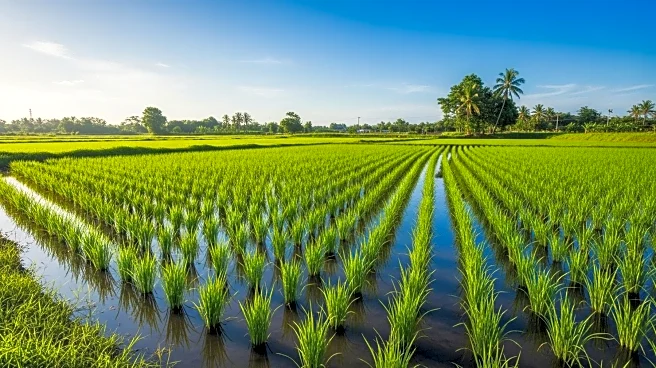What is the story about?
What's Happening?
The African Development Bank Group has approved a $22.8 million grant aimed at strengthening Mozambique's rice value chain and enhancing climate resilience. This initiative targets 30,000 smallholder farmers across four provinces, with the goal of increasing Mozambique's rice self-sufficiency from 50% to 75% by 2030. The project, known as the Rice Value Chain and Climate Resilience Project (RIVACREP), seeks to address food security challenges in Mozambique, a nation that currently relies heavily on rice imports. The project will focus on climate-smart technologies and infrastructure improvements, including the rehabilitation of irrigation systems and the introduction of drought- and flood-tolerant rice varieties.
Why It's Important?
This grant is significant as it addresses critical food security issues in Mozambique, a country where rice is a staple food yet production meets only half of the annual consumption needs. By increasing rice production and reducing import dependency, the project aims to improve rural livelihoods and economic stability. The initiative also aligns with broader development goals, such as the African Union's Agenda 2063 and the UN Sustainable Development Goals, by promoting sustainable agricultural practices and enhancing climate resilience. The focus on vulnerable populations, particularly women and youth, underscores the project's potential to foster inclusive growth and reduce poverty.
What's Next?
The project is set to run from December 2025 to December 2030, with a mid-term review scheduled for 2028. Mozambique's Ministry of Agriculture, Environment, and Fisheries will lead the implementation, ensuring environmental and social safeguards are in place. The project aims to quadruple rice yields and significantly increase household incomes, setting a foundation for scaling up production. Additionally, the establishment of small-scale milling factories and aggregator centers through public-private partnerships will further enhance the rice value chain. The project's success could serve as a model for similar initiatives in other commodities, contributing to a more self-reliant and resilient economy.
Beyond the Headlines
The project incorporates a strong nutrition component, promoting biofortified rice varieties rich in iron and zinc to address widespread malnutrition. With child stunting rates as high as 44% in some provinces, this aspect of the project is crucial for improving health outcomes. Furthermore, the inclusion of a Contingency Emergency Response mechanism highlights the project's adaptability to climate shocks and regional security challenges, ensuring rapid support during crises.
















